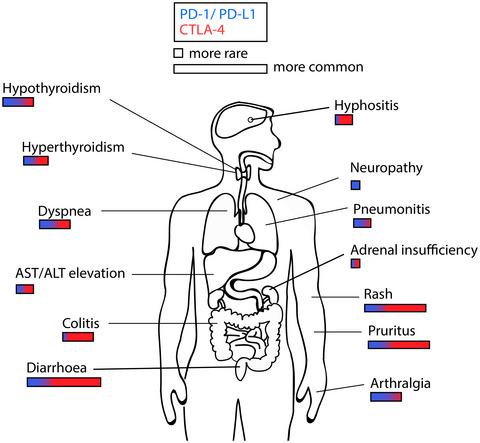当前位置:
X-MOL 学术
›
Clin. Exp. Immunol.
›
论文详情
Our official English website, www.x-mol.net, welcomes your
feedback! (Note: you will need to create a separate account there.)
Mechanisms of checkpoint inhibition-induced adverse events.
Clinical & Experimental Immunology ( IF 3.4 ) Pub Date : 2020-02-21 , DOI: 10.1111/cei.13421 P Urwyler 1 , I Earnshaw 2 , M Bermudez 2 , E Perucha 2 , W Wu 2 , S Ryan 2 , L Mcdonald 3 , S N Karagiannis 4 , L S Taams 2 , N Powell 2 , A Cope 2 , S Papa 1, 5
Clinical & Experimental Immunology ( IF 3.4 ) Pub Date : 2020-02-21 , DOI: 10.1111/cei.13421 P Urwyler 1 , I Earnshaw 2 , M Bermudez 2 , E Perucha 2 , W Wu 2 , S Ryan 2 , L Mcdonald 3 , S N Karagiannis 4 , L S Taams 2 , N Powell 2 , A Cope 2 , S Papa 1, 5
Affiliation

|
Immune checkpoint inhibition has revolutionized the treatment of several solid cancers, most notably melanoma and non-small-cell lung cancer (NSCLC). Drugs targeting cytotoxic T lymphocyte antigen (CTLA)-4 and programmed cell death 1 (PD-1) have made their way into routine clinical use; however, this has not been without difficulties. Stimulation of the immune system to target cancer has been found to result in a reduction of self-tolerance, leading to the development of adverse effects that resemble autoimmunity. These adverse effects are erratic in their onset and severity and can theoretically affect any organ type. Several mechanisms for immune-related toxicity have been investigated over recent years; however, no consensus on the cause or prediction of toxicity has been reached. This review seeks to examine reported evidence for possible mechanisms of toxicity, methods for prediction of those at risk and a discussion of future prospects within the field.
中文翻译:

检查点抑制引起的不良事件的机制。
免疫检查点抑制彻底改变了多种实体癌的治疗,尤其是黑色素瘤和非小细胞肺癌 (NSCLC)。针对细胞毒性T淋巴细胞抗原(CTLA)-4和程序性细胞死亡1(PD-1)的药物已进入常规临床使用;然而,这并非没有困难。研究发现,针对癌症的免疫系统刺激会导致自我耐受性降低,从而导致类似于自身免疫的不良反应的发生。这些不良反应的发作和严重程度不稳定,理论上可以影响任何器官类型。近年来,人们对免疫相关毒性的几种机制进行了研究;然而,对于毒性的原因或预测尚未达成共识。本综述旨在检查报告的可能毒性机制的证据、预测高危人群的方法以及对该领域未来前景的讨论。
更新日期:2020-02-21
中文翻译:

检查点抑制引起的不良事件的机制。
免疫检查点抑制彻底改变了多种实体癌的治疗,尤其是黑色素瘤和非小细胞肺癌 (NSCLC)。针对细胞毒性T淋巴细胞抗原(CTLA)-4和程序性细胞死亡1(PD-1)的药物已进入常规临床使用;然而,这并非没有困难。研究发现,针对癌症的免疫系统刺激会导致自我耐受性降低,从而导致类似于自身免疫的不良反应的发生。这些不良反应的发作和严重程度不稳定,理论上可以影响任何器官类型。近年来,人们对免疫相关毒性的几种机制进行了研究;然而,对于毒性的原因或预测尚未达成共识。本综述旨在检查报告的可能毒性机制的证据、预测高危人群的方法以及对该领域未来前景的讨论。











































 京公网安备 11010802027423号
京公网安备 11010802027423号